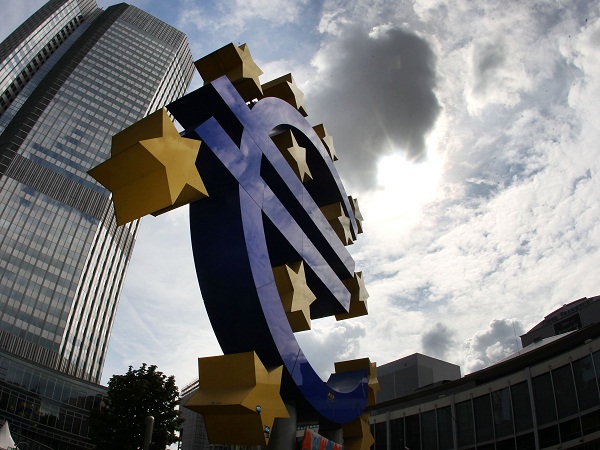
In this July 31, 2012 file photo the euro sculpture stands in front of the headquarters of the European Central Bank, ECB, in Frankfurt, Germany. The ECB announced Thursday, Nov. 8, 2012, that it has left its key interest rate unchanged at 0.75 percent despite sagging growth in the 17 countries that use the euro. The bank has already said that it has done enough and it’s up to governments to restore growth by cutting regulation and fixing their finances. AP
FRANKFURT, Germany—The European Central Bank may have to consider fresh policy measures to prevent deflation in the single currency area, but will not move at its meeting Thursday, analysts said.
“After all the Greek excitement over the summer, the ECB had probably been hoping for a very ordinary and dull meeting this week; to slowly move from vacation into business mode,” said ING DiBa economist Carsten Brzeski.
“Unfortunately, financial markets did not meet the ECB’s wishes. Latest market turmoil and, above all, the plunge in commodity prices should revive the deflation debate within the ECB’s governing council,” he said.
While Brzeski was confident that ECB chief Mario Draghi would not announce any new policy action Thursday, “on the back of lower inflation projections and increased uncertainty, Draghi will—in our view—open the door for stepping up QE,” or the contested bond-purchase program known as quantitative easing, he said.
UniCredit economist Marco Valli agreed.
“We expect no policy change at Thursday’s meeting,” he said, but suggested market attention would likely focus on any downward revisions to the ECB’s inflation forecasts and increased uncertainty about the implications for the eurozone from developments in China.
Draghi “is likely to sound more dovish than he did in July… We do not expect any explicit hint that the ECB is reconsidering its policy stance at this stage, but the door for further stimulus remains wide open,” Valli said.
Return of deflation fears?
Fears of deflation—a dangerous spiral of falling prices—persuaded the ECB to launch in March its controversial QE program, under which it plans to purchase 60 billion euros ($68 billion) of sovereign bonds each month until September 2016, or 1.14 trillion euros in all.
Initially, the scheme appeared to work, slowly pushing inflation back up in core eurozone economies such as France and Germany.
But euro-area inflation still only stood at 0.2 percent in August, way off the two percent level which the ECB regards as conducive to healthy economic growth. And that target may not be attainable until 2018.
Falling oil prices and signs of an economic slowdown in China spooked stock markets worldwide last week. And with the euro seen as a safe haven for investors, the strengthening single currency could undermine exporters’ competitiveness and also exert downward pressure on inflation.
The ECB is scheduled to publish its updated growth and inflation forecasts for the 19 countries that share the euro on Thursday and central bank watchers expect the projections to be downgraded noticeably.
“While we still think that sustained deflation remains very unlikely, consumer price inflation still looks set to remain below its target for a sustained period of time,” said Ben May at Oxford Economics.
“Indeed, on balance, we now think that inflation will rise a little more slowly next year than assumed in our August baseline forecast. On its own, this may not be enough to prompt an expansion of QE. But further bad news from China or renewed euro strength might eventually be enough to trigger additional or extended support via asset purchases,” he said.
No immediate action
Deka Bank economist Kristian Toedtmann said that at the traditional post-meeting press conference, ECB chief Draghi “is likely to stress the downside risks. But the scenario he will paint will not yet be threatening enough to warrant immediate action.”
Instead, Draghi was likely to underline the ECB’s readiness to ease monetary conditions still further should the economic outlook deteriorate substantially, Toedtmann said.
ECB executive board member Benoit Coeure insisted recently that “we do not wake up every morning and look at the economic indicators in order to decide whether to raise or lower interest rates or whether to stop or expand QE. We have a medium-term perspective.”
And he added: “We would only see ourselves forced to act if there was a fundamental change in the economic situation or the monetary stance was materially altered because of developments in the markets.”